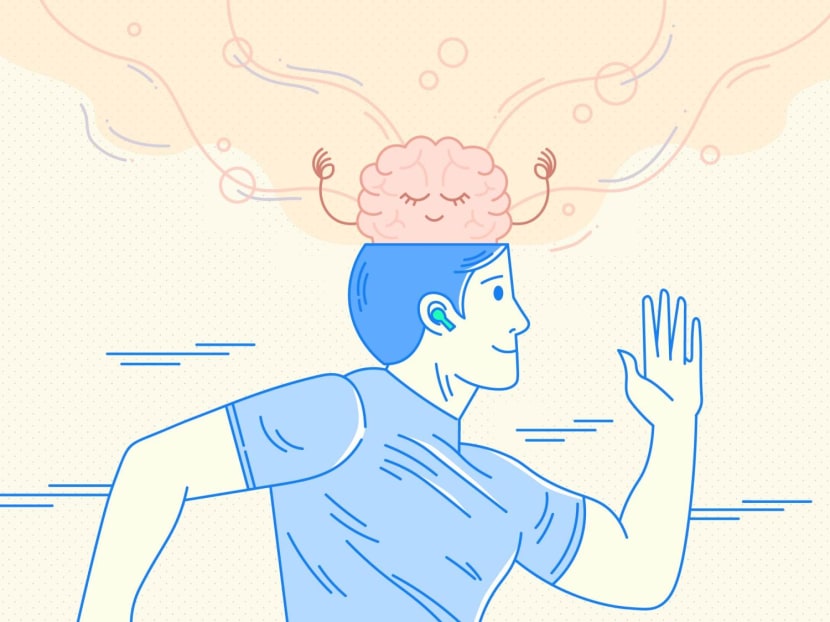Gen Zen: Feeling tired even after taking a break? Don't just sit on a couch all day

(Illustration: CNA/Nurjannah Suhaimi)
SINGAPORE — As a 34-year-old, I will soon be celebrating a full decade in the workforce and I have thus become unusually reflective of late. I have come to a stark realisation about myself: I do not know how to rest properly, even when I am given time away from work to do so.
Sure, I have had days off and taken leave from work, all in the pursuit of this concept of rest. What I end up doing is to use these periods to sleep more or sit in front of a television screen to while away the hours.
And after all these supposed breathers, I somehow do not feel recharged. At times, I return to work wishing that I had spent the free time doing something else instead.
It worries me, because I see a number of friends with more things going on in their lives — work, family and children, community work, hobbies and so forth. They somehow have the energy to keep up with all these, and then some.
As for me, I have just work, family and two cats, yet I always feel beat.
Am I a workaholic? If I don't rest properly, am I doing myself a disservice?
Is rest really all about replenishing energy lost during work, and nothing more?
In the spirit of getting a better break, I ironically decided to do some work on this topic of rest.
Through online research and speaking to mental health experts, I found out that rest has many different forms and that there are various practical steps to achieve each.
It is about being mindful and not going on autopilot on rest days.
Go pick up a hobby with friends, take that holiday overseas that you keep talking about, or pamper yourself with small doses of rest — also known as micro breaks — throughout the day.
As for myself, I admittedly spent a Sunday putting together this article about what I've learnt. One step at a time, I guess.
NOTHING WRONG WITH PASSIVE REST
For one, mental health experts assured me that there is nothing wrong with some scrolling of social media content or watching shows, per se.
Dr Geraldine Tan, director and principal psychologist at The Therapy Room, said that if someone is physically exhausted, then passive resting is something we can do.
It is fine to just sit there and watch a movie for a period of time, she added.
The guilt that comes after passively sitting in front of the screen might partly stem from how we are conditioned to overly focus on productivity, the experts explained.
Ms Nandini Nagpal, a professional counsellor from Singapore-based end-to-end therapy platform Talk Your Heart Out, said: “To ‘do nothing’ then feels like a waste of time.
“We don't realise that it can be counterproductive to be overly productive.”
Before I could jump for that remote control again, though, another expert had this to say.
Ms Lysia Tan, clinical psychologist from Mind What Matters, cautioned: “(Passive rest) may become a problem when it is done in excess, and in isolation, at the exclusion of other coping strategies.”
My research on the topic pointed to seven types of rest that a person needs to feel recharged, based on the work of Dr Sandra Dalton-Smith, a physician, researcher and author.
Besides physical rest, the other six are mental, emotional, social, sensory, creative and spiritual rest.
And as one would imagine, binge-watching your favourite show for the entire weekend might not fulfil all these rest needs.
For example, to have social rest is not just about distancing oneself from stressful relationships, even though being glued to the couch may sometimes help save you from dealing with them.
Rather, social rest includes spending time with positive and supportive people.
Sensory rest sounds the simplest, but it can be quite a challenge. It entails a form of sensory deprivation, such as removing bright light emitted by mobile phones and television screens from one's environment, for instance.
Taking a creative rest means pausing the daily grind of work. Taking time to pursue a leisurely creative activity can help inspire a person with new ideas and bring joy.
Finally, spiritual rest involves engaging in something that is greater than oneself, and can be found through prayer, meditation, as well as community involvement.
THE IMPORTANCE OF BEING MINDFUL
Having reflected on the conversations I had with the mental health experts about what I faced when it came to resting, I realised that it all comes back to the concept of mindfulness.
Firstly, I need to be aware of the kind of break that I need. And when I do, I should be conscious of the amount of time I let myself have that rest, so that I come out of it more recharged and without regret.
Dr Tan from The Therapy Room said: “We plan our work, but… we've never been taught to plan our play.”
Play and rest should not be something a person “steals” time for, she added. Instead, you should “give permission” to yourself to let your hair down as needed, lest you keep regretting the time spent not doing work.
Secondly, when I am physically taking myself away from work, for example — be it taking micro pauses during a work day or going on leave — I need to be mindful to disengage mentally as well.
A colleague told me that she tried to ignore her WhatsApp entirely when she went on a holiday recently and it worked for her. I was piqued by the idea, though the thought of it makes me anxious.
Perhaps I could start small, like taking micro breaks throughout the day.
Dr Tan suggested filling up these short breathers with small actions that are not related to work, in order to distract my mind from the task at hand.
Breathing exercises during these short intervals can help, too, the experts said.
Finally, regardless of how I choose to rest, the experts advised that it is important to manage my expectations.
“Expectations that are immovable inevitably invite stress and worry, and hence having expectations towards relaxation is a contradiction in itself,” Ms Tan from Mind What Matters said.
Instead, having more flexible expectations could better help a person “find the sweet spot of fulfilment in rest”, she added.
Most importantly, the experts reminded me that I should take it slow and find a method of rest that best suits me, instead of doing all forms of relaxing activities I see suggested online and expecting them to work instantaneously.
“Start with just one. The idea is not to make it overwhelming and to manage our own expectations around it,” Ms Nagpal from Talk Your Heart Out said.
WHEN LEISURE LIFTS THE PRESSURE
Armed with the knowledge of these methods, I tried to give myself a proper rest routine in recent weeks.
When working from home, for example, I would make it a point to step away from the laptop for a couple of minutes in between tasks or interviews.
I used to use up these precious minutes to clear what I felt were smaller tasks such as looking through my email or replying to work-related texts on my phone.
When I took the time to have a proper mental break by chatting with colleagues or making myself a cup of coffee and savouring it as suggested by Dr Tan, I found that such momentary reprieve really allows me to resume my daily grind with a small spurt of energy.
What I found works for me somewhat is in picking up old hobbies — one of which is jamming with friends.
In the past, I loved playing the guitar and tended to enjoy it more when I got to do it with friends. This is perhaps a case of creative rest meeting social rest.
Then, these hobbies began to feel like a commitment that sucked the joy out of what should have been a good time. The songs I needed to learn from our jamming lists felt like extra tasks to do, which then meant that I had to carve out more time to do them.
Now, I've learnt not to place such overbearing expectations on my hobbies that would get in the way of rest, as what the experts recommended.
Of late, I have taken to listening to and learning some songs by British psychedelic-rock band Pink Floyd who were big in the 1960s and 1970s.
The pieces are not on any of my bands’ jamming list. And I cannot yet play them as well as I would like.
But when I put down my guitar after playing, I feel joy. More importantly, I feel rested.








